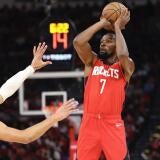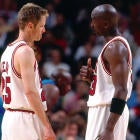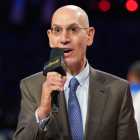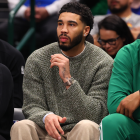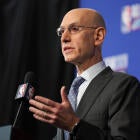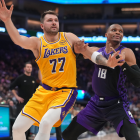Steve Kerr earned Michael Jordan's respect, has continued to connect with star players during storybook career
'The Last Dance' has given us a glimpse into what has made Kerr so successful on the sideline
Steve Kerr is one of the greatest 3-point shooters to ever play in the NBA, and in five-plus seasons with the Golden State Warriors, he's proven to be a historically great coach. It's important that we acknowledge these things up front, because too often Kerr is described, and perceived, even by himself, as some kind of golden-ticket winner whose most redeeming "talent" has been lucking onto some of the greatest teams in history.
That said, Kerr has lived an extraordinarily charmed basketball life. When Lute Olson gave him the last scholarship he had to offer at the University of Arizona, he was never supposed to get anywhere near the NBA. More than 35 years later, Kerr has carved out a career that will almost certainly land him in the Hall of Fame as -- all told -- an eight-time champion and counting.
That's what happens when you play for Phil Jackson and Gregg Popovich, when you play with Michael Jordan, Scottie Pippen, Tim Duncan and David Robinson, and when you coach Stephen Curry and Kevin Durant. In just those names right there, to say nothing of Klay Thompson, Dennis Rodman, Tony Parker, Manu Ginobili and/or Draymond Green, Kerr has hitched his wagon to arguably six of the top 20 players of all-time and the two of the four most accomplished coaches in history.
Now it's Kerr setting his own marks.
In fewer than six seasons at the helm of the Warriors, Kerr is already one of just six coaches in NBA history to win at least three championships. That is not merely a product of the talent he inherited. Remember, the bulk of the Warriors roster that Kerr took over in the summer of 2014 had just finished winning 51 games and losing in the first round under Mark Jackson. Less than 12 months later -- again, with virtually an identical roster -- Golden State had won 67 games and a championship.
In watching "The Last Dance" -- the ESPN/Netflix 10-part series chronicling the 1997-98 Chicago Bulls that will conclude this Sunday -- the parallels between the rise of the Bulls and the rise of the Warriors are obvious. They both had really smart, progressive GMs who'd inherited a superstar and proceeded to put a perfect team around him. (Yes, Jerry Krause was a great GM).
Those GMs then had the guts, against the wishes of their star player, to replace a successful coach who had led their team to the playoffs with a first-time coach. Remember, Curry lobbied for Mark Jackson to stay. Jordan said on the documentary that he "wasn't a Phil Jackson fan when he first came in because he was coming in to take the ball out of my hands."
Kerr did the same thing with Curry, whose pick-and-roll frequency went from 55 percent of his possessions in Jackson's final year to 46 percent in Kerr's first season, and it has never exceeded 42 percent in any season since, per Synergy. By contrast, Curry's catch-and-shoot frequency went from 16 percent in his final season under Jackson to 24 percent in his first season under Kerr, and that number has risen every year since, per Synergy.
In other words, Curry stopped controlling the ball so much. His usage rate remained roughly intact, which means the ball still came back to him -- but the movement in between, both ball and man, became the key that unlocked the Warriors. Kerr very clearly got this from Phil Jackson, whose Triangle offense prioritized these same movement-oriented principles, and the options they created, over the diminishing returns of extreme superstar reliance, and later from Popovich, whose flow-based attack has colored so much of Golden State's offensive identity.
Aside from the obvious nostalgia of watching Michael Jordan spacewalk, noting the influence Kerr's playing days have had on his coaching has been one of my favorite parts of this series. It's not just the offensive philosophies. It's Kerr's innate ability to not just exist within the orbit of all-time talent, but to actually challenge that talent, to stand up for his role in the process and believe in his worth while knowing his place at the same time.
That's a balance not easily achieved, confidence and humility blended, understanding when to demand respect and when to give it. That's a guy who will punch Michael Jordan, who will get in Draymond Green's face, but who will also laugh at himself and defer credit for his successes. Kerr's career was one long master class in superstar management. He earned Jordan's respect, and now he's gone on to earn Curry's respect, and Durant's respect, by proving he can get the most out of them, even if that means asking less of them.
This has all been on display in "The Last Dance" as Kerr has become a more prominent figure in recent episodes. Presumably, we'll see a lot of him in episode 9, which will cover the 1997 Finals in which Kerr hit the series-clinching shot in Game 6. Just another chapter in a storybook career, one which Kerr will admit he fell into, but not one he hasn't earned.





